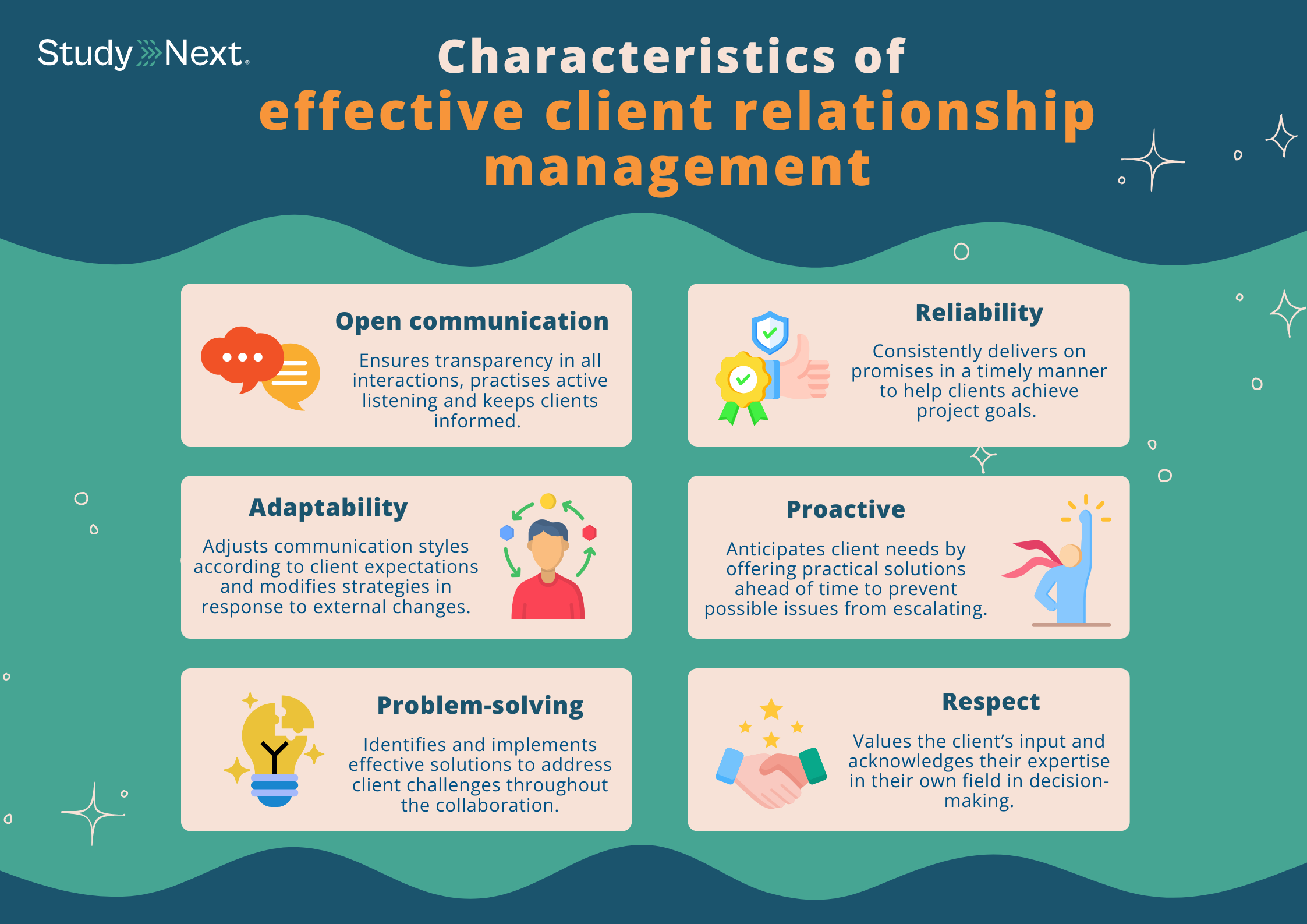In This Article
- How to build strong client relationships in business
- What does client relations mean?
- Characteristics of effective client relationship management
- Benefits of positive client relationship management
- Common mistakes to avoid in client relationship management
- How postgraduate studies can improve client relations
- Apply postgraduate insights to build stronger client relationships

Fostering strong client relationships often plays an important role in creating reliable revenue streams that can help businesses stay competitive and profitable. You can implement a variety of client relationship management strategies to enhance client satisfaction and retention.
This article highlights practical ways to build meaningful client relationships and demonstrates how these connections can benefit your business. It also discusses common mistakes in managing client relationships and how you can avoid them.
How to build strong client relationships in business
Building strong client relationships often begins with researching and understanding prospective clients’ needs. Once you’ve reached out to your client and started engaging with them, you should focus on demonstrating your credibility, building rapport and adapting to client preferences. Effective communication and seeking client feedback also play a vital role in fostering a strong and positive relationship. Learn more below:
Research about clients
Before your first official meeting with your client, take time to understand your client’s background by researching their business, professional role and industry. You can also look into their business challenges, historical performance and visions to better understand what business goals they are trying to achieve.. This preparation allows you to customise your approach and demonstrate how you can provide value to their business. Entering the meeting with this knowledge also gives clients the confidence that you’re prepared to fully commit to this collaboration.
Establish your credibility
One effective way to build strong client relationships is by demonstrating your expertise. Clients want to feel reassured that they are working with someone who not only understands their needs but can also provide valuable insights and solutions. You can earn their trust by clearly explaining your field of expertise, providing expert industry insights to support informed decision-making and sharing examples of similar challenges you have successfully managed for other clients.
Your attitude during client meetings also plays a major role. You should always have a positive demeanour when engaging with clients to show your enthusiasm for their business. This can convince them that you are invested in their goals, strengthening the foundation for long-term partnerships.
Build rapport with clients
Building a human connection with clients can foster greater trust and help make the professional relationship feel less transactional. This is usually done through light conversations, such as discussing the weather, upcoming weekend plans or interests outside of work. By listening attentively and showing genuine interest, you can establish a stronger rapport and create a more comfortable working dynamic. However, it’s important to tread carefully as some clients may prefer to keep interactions strictly work-related. Remaining mindful and observant allows you to identify and respect boundaries while still focusing on providing value.
Adjust accordingly to client preferences
You can promote stronger collaboration by adapting your approach according to your client’s preferences in communication style, method and channel. For example, some clients may prefer in-person meetings, while others may find online video calls more convenient. Similarly, certain clients may prefer detailed written reports, whereas others may prefer regular informal check-ins. By adapting your workflow and accommodating their preferences, you can demonstrate that you’re flexible and attentive to their needs, which can ensure a smoother communication process.
Practice effective communication
Strong communication skills are essential for nurturing a positive client relationship. You always want to be clear when delivering information to prevent misunderstandings. Leveraging active listening techniques also ensures that you understand their needs. Being transparent about potential issues allows you to manage client expectations and work with them to develop alternative solutions before problems escalate. You should also keep your clients informed by providing timely updates. Clear, open and consistent communication helps to keep everyone aligned to business goals.
Get feedback from clients
Regularly seeking feedback from clients helps you understand what’s working well and what areas need to be improved. It shows clients that you value their opinions and are committed to continuous improvement while maintaining a positive long-term relationship. You can collect feedback in various ways, such as asking for their input after meetings or sending satisfaction surveys. These insights can help you refine your approach in future collaborations to create better client experiences.
What does client relations mean?
Client relations refers to the professional relationship between an organisation and its clients. It also involves various strategies and practices designed to deliver quality service, build client loyalty and enhance their satisfaction. This may include developing rapport, tailoring workflows according to client preferences and actively seeking feedback.
Unlike customer relations, which often focus on one-off or short-term transactions, client relations typically involve long-term engagement with individuals, professional groups or organisations throughout the duration of a project or partnership.
Characteristics of effective client relationship management
Effective client relationship management relies on key characteristics like open communication, reliability and adaptability. Other important aspects include being proactive, having strong problem-solving skills and showing respect. These qualities are necessary to strengthen and sustain client relationships. Explore what these traits entail below:

Benefits of positive client relationship management
Fostering strong client relationships offers great advantages for businesses, including enhanced client retention, increased revenue and stronger brand reputation. These relationships can also help optimise business operations and support long-term growth. Find out more below:
- Improved client retention: Delivering excellent service shows clients that you prioritise their interests and value their business. This encourages clients to continue choosing your business over competitors, which can foster long-term loyalty and stronger relationships.
- Revenue growth: When clients trust you, they’re more inclined to continue working with you or extend their partnership. This trust also makes them more open to upselling and cross-selling opportunities, which can boost revenue and profitability.
- Enhanced brand reputation: Clients who are highly satisfied with your service are more likely to recommend your business to others, whether through word-of-mouth, reviews or within their professional networks. These referrals can strengthen your brand visibility, credibility and reputation in the market. This can also help your organisation attract and acquire new clients.
- Optimised business operations: Clients can provide valuable insights regarding your service, offerings and business processes. Their feedback can be utilised to improve operations and overall efficiency, ultimately helping you deliver better experiences for future clients.
- Long-term business growth: By cultivating strong client relationships, you can establish a steady foundation for ongoing revenue and keep your organisation competitive in the market. This positions your business for sustainable long-term growth.
Common mistakes to avoid in client relationship management
Common mistakes in client relationship management include showing impatience when clients request changes, overpromising and underdelivering as well as dismissing client input. Providing delayed responses, inconsistent service quality and negative reactions to setbacks can also lead to poor client experience. Discover how you can avoid these mistakes below:
-
Displaying impatience in handling client changes
Sometimes, clients may change their minds on decisions or make adjustments to aspects like project scope and timelines. When this occurs, you need to remain flexible and focus on the bigger picture, which is helping your clients achieve their goals while maintaining a positive relationship. This perspective can make it easier for you to manage changes with patience. -
Overpromising and underdelivering
It’s crucial to establish realistic timelines with clients to ensure deliverables are met and targets are achieved successfully. Agreeing to deadlines that are too ambitious and then failing to meet them can negatively affect the client’s experience working with you and damage your brand’s reputation. -
Neglecting client input
Dismissing input from your client can diminish trust and satisfaction as it signals that their opinions aren’t valued in the decision-making process. To build a strong client relationship, it’s important to listen attentively to their needs and incorporate their perspectives throughout your collaboration. Their insights can also help you improve services, products and overall experience for current and future clients. -
Delaying responses to clients
It’s important to keep clients informed by responding to their messages promptly, especially when issues arise. This demonstrates that their needs are prioritised, prevents problems from escalating and proves that you’re reliable when they need assistance. Although you may not always be available, especially outside of traditional working hours, giving them a quick acknowledgement through a brief message or phone call can make clients feel valued and supported. -
Delivering inconsistent service quality
If you provide excellent service on one occasion but fail to maintain it the next time, clients may begin to lose confidence in your reliability and hesitate to continue working with you. It’s essential that you deliver high-quality service consistently to build trust and improve client retention rates. -
Responding negatively to setbacks
Setbacks can be frustrating, but it’s essential to approach them with a positive attitude. While you should be transparent and honest with clients about the challenges you’re facing, you also need to show resilience and determination to overcome them. Clients are more likely to trust you when you remain composed and proactive in finding effective solutions, rather than being discouraged by obstacles.
How postgraduate studies can improve client relations
Pursuing postgraduate studies can greatly boost client relations by enhancing your capabilities to communicate and build rapport with others. Not only do these courses equip you with specialised knowledge, but they can also improve your strategic thinking skills, enabling you to better understand and respond to client needs. Recognising the value of effective client relationship management, many postgraduate programs across various disciplines include units designed to help you navigate these professional connections.
For example, the Master of Business course at the University of Melbourne features a discipline core unit called Effective Stakeholder Management, which explores the impact of stakeholder management on organisational processes and strategic decisions. In this unit, you’ll learn practical analytical tools and skills to engage with stakeholders. Some of the topics covered include internal and external stakeholder relationships, dealing with stakeholder conflict and stakeholder communication and influence.


Why study business at Melbourne?
- Core business knowledge. Cover accounting, finance, decision-making and analytics to build solid foundational knowledge.
- Hone your leadership skills. Build comprehensive leadership and management knowledge, covering topics like adaptive leadership, talent management and stakeholder engagement.
- Meet today’s challenges. Learn how to navigate decision-making in a digitised world, lead sustainable organisations and manage lean resources for high performance.
Course aims
The Master of Business is designed for students to learn and apply concepts around:
- Adaptive and strategic leadership
- Talent and team management
- Influencing and engaging stakeholders for strategic outcomes
- Complex decision-making in a digitised world
- Customer service excellence and developing customer-centric cultures
- Managing sustainability for value
- Strategy at the front line
- Effective resource management: high performance and lean operations
One of the elective units in the University of Sydney’s Master of Business Administration course is Influencing Skills for Stakeholder Engagement. This unit focuses on how influence shapes decision-making to achieve the best results, examining power dynamics and the complexities of human behaviour. Throughout this unit, you’ll strengthen your ability to influence and build a solid understanding of how to manage diverse stakeholder relationships.


The Master of Business Administration is a postgraduate coursework degree that will develop your leadership, communication and critical thinking skills and prepare you for applying these skills in the complex global business environment. You will complete core and elective units and a design-led strategy capstone unit.
The part-time degree is purpose-built to unlock your personal and professional ambitions and refine your leadership skills. Delivered on the CBD campus, this flexible course can be completed in two to three years of part-time study.
In the Master of International Business course at Griffith University, you’ll take on the Negotiation Strategy and Skill core unit, which delves into the fundamentals of negotiation, including strategy and tactics, negotiation planning and analysis as well as power, ethics and social responsibility. It also explores the critical role of culture in global negotiations. With a strong focus on interpersonal negotiations within a management context, the unit equips you with the skills to navigate complex negotiation scenarios effectively


The Griffith Master of International Business enrols students from all over the world, particularly professionals from Australia, Asia, Africa, Europe and North and South America. Griffith was the first university in the Southern Hemisphere to offer a postgraduate International Business degree. This program will enable students to develop a high level of competency in international business and equip them with strategic thinking and practical skills in dealing with a dynamic and culturally diverse global economy, which is increasingly digitised. This program emphasises engagement with industry. There are exciting opportunities for students to conduct projects with local and international corporations, as well as participate in supervised internships and exchange programs in Asia, North America and Europe through our worldwide alliances.
If you’re interested in furthering your qualifications in marketing, the Master of Marketing course at the University of Western Australia offers Business Relationship Management as an elective. This unit covers essential topics in client management, such as portfolio client management techniques, relationship maintenance and client management within different cultural contexts. You can also develop practical skills by learning sales strategies and analysing business interactions.


Marketing focuses on making and keeping customers by finding, communicating and sustaining the competitive advantage that makes a company truly successful. Topics covered in Marketing include advertising, company strategy, competitive analysis, and value creation.
Marketing students at UWA have the opportunity to undertake projects for real-life organisations and have previously worked with companies including Coles, Google, Microsoft, Rio Tinto, Tourism WA, Transperth and Westpac.
With classes available during the day and in the evening, this course is suitable for both the busy professional and the full-time student.
Victoria University’s Master of Financial Planning includes the Financial Plan Construction and Client Management capstone unit, which equips you with the skills to build and manage client relationships while delivering financial planning advice that meets industry standards. In this unit, you’ll learn how to conduct initial client interviews, create comprehensive financial plans and present them to clients.


VU Online’s Master of Financial Planning will give you a thorough understanding of the ethical and professional capacities required of financial planning advisers. You will enhance your foundational knowledge of financial planning and build advanced skills, allowing you to navigate an ever-evolving landscape successfully.
Whether you are an experienced financial planner or new to the field, this master's program will provide in-depth knowledge and skills to help you stand out as an expert. Studying for a Master of Financial Planning will empower you to build a holistic understanding of the requirements of accredited financial planners, adding value to your career, clients and organisation, giving you an edge in your field.
Apply postgraduate insights to build stronger client relationships
Strong client relationships can contribute to your business’s long-term growth and success. Nurturing these professional connections requires deep expertise in your field and excellent communication skills. Many postgraduate courses include units that can help you develop these abilities, allowing you to implement client relationship management techniques effectively. Kickstart your journey and discover diverse postgraduate business courses in Australia.























